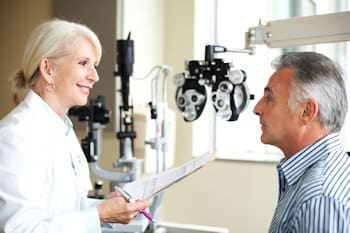Eye Specialist Doctors in Cape Coral
Are you over age 60? If so, you may need an eye specialist. Southwest Floridians can come see our skilled doctors at Elmquist Eye Group in Cape Coral. We treat eye diseases including age-related macular degeneration, diabetic retinopathy and glaucoma among others. In this article, we will focus on glaucoma, a progressive eye disease that left untreated, eventually leads to blindness.
What is glaucoma?
 There are two types of glaucoma, open-angle and angle-closure glaucoma. Open-angle glaucoma happens progressively over time, leading to tunnel vision. Angle-closure glaucoma is an acute condition that happens very quickly, with sudden changes in vision.
There are two types of glaucoma, open-angle and angle-closure glaucoma. Open-angle glaucoma happens progressively over time, leading to tunnel vision. Angle-closure glaucoma is an acute condition that happens very quickly, with sudden changes in vision.
Both forms cause damage that cannot be reversed, but prompt treatment by an eye specialist can prevent further damage. Glaucoma is treatable when it is detected early. There are some early warning signs you should be aware of.
Signs of glaucoma
If your eyes are swollen, this may indicate an internal pressure buildup within the eye, a hallmark sign of glaucoma. If you have tunnel vision, this may be an indication that you have open-angle glaucoma that is in the later stages. The tunnel vision is actually a gradual narrowing of peripheral vision. Sadly, most people don’t realize sight is becoming limited until they have significant tunnel vision. It is incredibly important for you to see an eye specialist if you notice any changes in vision, even small ones.
Many people with glaucoma also have blurry vision. Because blurred vision can be a sign of nearsightedness as well as cataracts, many patients cannot make the distinction. If your vision is rapidly becoming more blurry, this may be a sign of glaucoma, because both nearsightedness and cataracts develop much more slowly. You may also see halos around lights at night, or experience a rainbow effect around lights.
You may also be seeing patchy spots. This is usually a sign that glaucoma has progressed to the point that it is affecting the optic nerve. When the nerve is damaged, the visual signal from the eye is disrupted, resulting in the patchiness that glaucoma patients often see. If not treated, the optic nerve becomes more damaged over time, leading to permanent damage as the nerve fibers begin to die off.
Glaucoma is usually not associated with any visible changes to the eye. Many patients do have eyeball redness and often notice that they have large pupils which do not dilate in light. Both of these may be signs.
Pain is an indication that something is wrong in your body, and eye pain is certainly no different. Sudden eye pain is a classic sign of angle-closure glaucoma, so if you have a rapid onset of pain, seek treatment immediately.
The biggest sign of glaucoma is a high internal eye pressure called high intraocular pressure. The air puff test that eye doctors perform as part of a routine eye exam is designed to measure this pressure. Healthy pressure is between 10 and 22 mmHg; anything higher may indicate glaucoma. High pressure does not cause pain and is often without symptoms, but it does damage the optic nerve and other eye structures.
You may find that glaucoma or other eye conditions or diseases happen during your lifetime. If it does, you will need an eye specialist in Cape Coral. Luckily for you, the trusted doctors at Elmquist Eye Group can treat your entire family. Contact our experienced team today to schedule your appointment.
